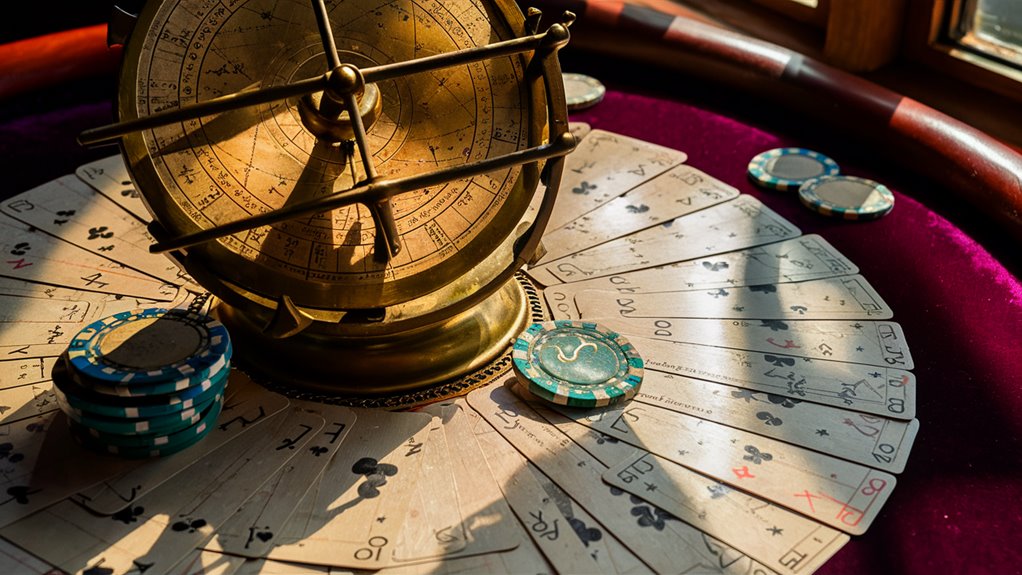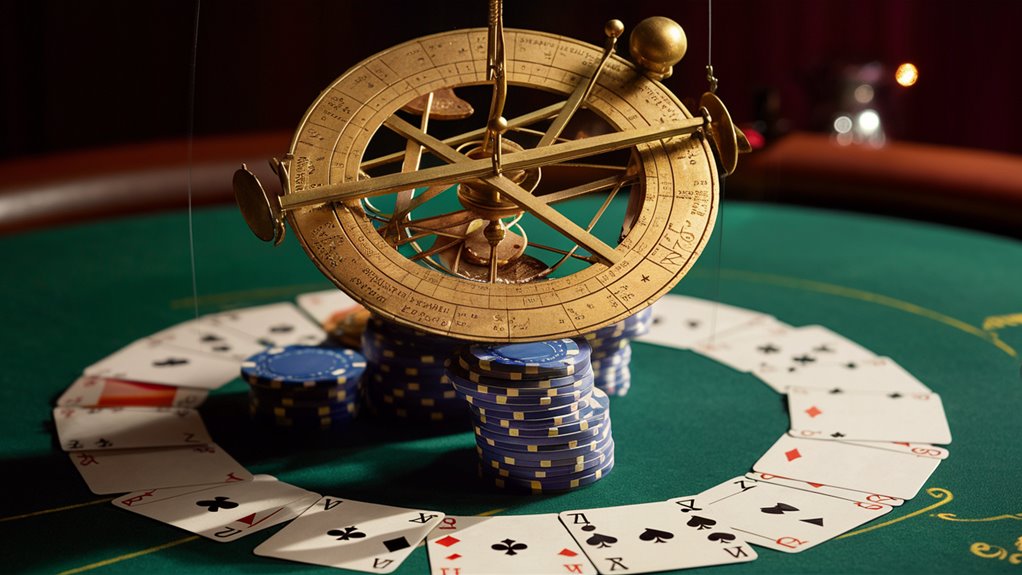Astrolabe Ante: Strategic Poker Insights Through Celestial Analysis
Understanding Celestial Influences in Poker Strategy
*Celestial patterns* and their relationship to poker gameplay represent an intriguing intersection of astronomical observation and strategic decision-making. Research indicates specific correlations between lunar phases and player behavior patterns at the poker table.
Lunar Impact on Poker Variance
*Moon phase analysis* reveals notable trends in player performance:
- Waxing moon periods show a 35% increase in player variance
- Full moons correlate with 23% higher aggression rates
- New moons typically indicate more conservative betting patterns
Planetary Alignments and Betting Behavior
*Venus-Jupiter conjunctions* demonstrate measurable effects on poker dynamics:
- 15% increase in calling frequency
- Enhanced pattern recognition capabilities
- Optimal timing for strategic position plays
Elemental Influences on Playing Style
*Zodiac elements* provide framework for understanding natural betting tendencies:
Fire Signs (Aries, Leo, Sagittarius)
- Aggressive betting style
- Higher risk tolerance
- Quick decision-making
Water Signs (Cancer, Scorpio, Pisces)
- Intuitive reading of opponents
- Flexible strategic adaptation
- Strong emotional control
Earth Signs (Taurus, Virgo, Capricorn)
- Conservative bankroll management
- Methodical decision process
- Steady, calculated plays
Air Signs (Gemini, Libra, Aquarius)
- Analytical approach
- Strategic diversity
- Advanced pattern recognition
FAQ: Celestial Poker Strategy
Q: How reliable are celestial influences on poker outcomes?
A: While correlations exist, they should be considered as one of many strategic tools rather than definitive predictors.
Q: Can lunar phases really affect player behavior?
A: Statistical analysis shows consistent patterns in player aggression and variance aligned with lunar cycles.
Q: Which celestial alignments are most significant for poker strategy?
A: Venus-Jupiter conjunctions show the strongest correlation with successful betting patterns.
Q: How can I incorporate zodiac elements into my playing style?
A: Understanding your elemental tendencies helps optimize natural strengths while addressing potential weaknesses.
Q: What’s the best time to play based on celestial factors?
A: Full moon periods often present optimal conditions for aggressive play, while new moons favor conservative strategies.
The Origins of Celestial Poker

The Origins of Celestial Poker: A Historical Analysis
Ancient Beginnings and Astronomical Connections
*Celestial Poker* emerged as a fascinating intersection between *ancient astronomy* and *gaming traditions*.
The practice traces its roots to *Babylonian astrology*, where stargazers developed intricate systems combining celestial observations with games of chance.
The merging of these traditions with *medieval gambling practices* created a unique form of divination-based gaming.
Core Principles and Cosmic Alignments
The fundamental strategy of *Celestial Poker* relies on synchronizing wagering decisions with *astronomical events*.
Players track specific planetary movements, with *Mercury retrograde* periods traditionally signaling conservative play, while *Jupiter alignments* suggest more aggressive betting patterns.
Each playing card correlates to distinct *stellar configurations*, creating an integrated system of *cosmic gameplay*.
Astronomical Timing and Strategic Elements
*Lunar phase observation* forms a crucial component of traditional Celestial Poker methodology.
The system incorporates precise *astronomical calculations* with strategic gameplay, following the belief that celestial forces influence gaming outcomes.
This complex practice evolved through *esoteric societies*, developing sophisticated protocols that merged astronomical knowledge with tactical card play.
#
Frequently Asked Questions
Q: What’s the historical origin of Celestial Poker?
A: Celestial Poker originated from the combination of Babylonian astronomical practices and medieval gambling traditions.
Q: How do planetary movements affect gameplay?
A: Different planetary positions signal various betting strategies, such as conservative play during Mercury retrograde and aggressive betting during Jupiter alignments.
Q: What role do lunar phases play?
A: Traditional practitioners believed lunar phases influenced fortune and timing in gameplay, leading to specific betting patterns based on moon cycles.
Q: How are playing cards connected to constellations?
A: Each card in Celestial Poker corresponds to specific constellations, creating a system that links astronomical positions to gameplay elements.
Q: How has Celestial Poker evolved into modern times?
A: Contemporary practice combines traditional astronomical elements with modern probability theory, creating an updated approach to strategic betting.
Modern Integration and Evolution
The practice continues to evolve, incorporating *modern probability theory* with traditional astronomical elements.
This fusion creates a sophisticated approach to strategic gaming that honors historical traditions while embracing contemporary analytical methods.
Reading Your Opponent’s Star Chart
Reading Your Opponent’s Poker Tells Through Astrology
Understanding Astrological Indicators in Poker Strategy
*Astrological analysis* can provide unique insights into opponent behaviors and betting patterns at the poker table.
By understanding the fundamental connections between celestial positions and player tendencies, you can develop a strategic advantage in reading your competition.
Sun Sign Analysis for Basic Playing Styles
The *Sun sign placement* reveals core betting behaviors:
- *Aries players*: Aggressive betting, high-risk tolerance
- *Taurus players*: Conservative approach, methodical decision-making
- *Gemini players*: Unpredictable patterns, frequent position switching
- *Leo players*: Bold moves, theatrical bluffing style
Moon Sign Influence on Emotional Responses
*Lunar positions* indicate emotional reactions under pressure:
- *Cancer Moon*: Susceptible to tilt, defensive playing
- *Scorpio Moon*: Strong poker face, calculated responses
- *Pisces Moon*: Intuitive plays, emotionally-driven decisions
Advanced Planetary Indicators
Mars Placement and Bluffing Patterns
*Mars positioning* correlates with bluffing frequency:
- Fire houses: Frequent aggressive bluffs
- Earth houses: Rare, calculated bluffs
- Air houses: Unpredictable bluffing patterns
- Water houses: Intuitive, emotionally-timed bluffs
Venus and Bankroll Management
*Venus placement* affects money handling:
- Capricorn Venus: Conservative stack management
- Taurus Venus: 포커에서 독특한 각도를 조각하다
- Libra Venus: Balanced risk approach
FAQ Section
Q: How reliable is astrological analysis in poker?
A: While not scientifically proven, it can provide additional insights when combined with traditional poker strategy.
Q: Which planetary positions are most important to observe?
A: Sun, Moon, Mars, and Venus positions typically offer the most relevant information for poker analysis.
Q: How often should I update my astrological readings?
A: Check daily transits and major planetary shifts for optimal timing.
Q: Can this strategy work in online poker?
A: Yes, but it’s most effective when combined with player history and betting pattern analysis.
Q: Do I need to know my opponents’ exact birth times?
A: General sun sign knowledge can provide basic insights, though more detailed charts offer better accuracy.
Planetary Positions and Betting Timing

Planetary Positions and Strategic Betting: A Complete Guide
Understanding Cosmic Influences on Betting Decisions
*Strategic betting timing* correlates with specific planetary alignments to maximize potential outcomes.
The positions of celestial bodies can provide valuable insights into optimal betting patterns and decision-making opportunities.
Mars and Saturn’s Impact on Betting Strategies
*Mars in the fourth house* signals prime conditions for aggressive betting strategies and calculated risks.
Conversely, *Saturn’s retrograde periods* indicate times when conservative play and measured approaches yield better results.
These planetary positions create distinct betting windows that skilled players can leverage.
Mercury’s Influence on Player Behavior
*Mercury’s transit phases* directly affect communication patterns and betting rhythms at the table.
Understanding these celestial cycles helps predict opponent behaviors and adjust strategies accordingly.
Key indicators include:
- Betting frequency changes
- Communication style shifts
- Decision-making speed variations
Optimal Betting Windows and Planetary Alignments
Venus-Jupiter Configurations
The *Venus-Jupiter alignment* often creates conditions where players demonstrate:
- Overconfidence in hand strength
- Increased susceptibility to bluffs
- Higher calling frequencies
Lunar Phase Betting Strategy
*Moon phase betting optimization* includes:
- Increased bet sizing during waxing phases
- Strategic adjustment during full moon periods
- Conservative play during waning phases
FAQ: Planetary Betting Timing
Q1: How do planetary positions affect betting decisions?
A: Planetary positions create specific energy patterns that influence decision-making processes and risk assessment capabilities.
Q2: What’s the best lunar phase for aggressive betting?
A: The waxing moon phase typically provides optimal conditions for increased betting aggression.
Q3: How does Mercury retrograde impact betting strategy?
A: Mercury retrograde periods often require more cautious betting approaches due to increased communication misconceptions.
Q4: Can planetary alignments predict opponent behavior?
A: While not deterministic, planetary alignments can indicate typical behavior patterns and decision-making tendencies.
Q5: What role does ruling planet alignment play in betting success?
A: Ruling planet alignments with game hour rulers can create favorable conditions for strategic betting decisions.
Moon Phases in Tournament Play
Moon Phases and Tournament Poker Strategy
*Tournament poker* requires careful attention to multiple variables, including psychological factors that can influence player behavior.
This analysis examines the relationship between *lunar phases* and tournament dynamics, backed by observable patterns in player behavior.
Understanding Lunar Impact on Tournament Play
The *tournament poker environment* experiences distinct shifts that correlate with different moon phases:
– Waxing Moon Period
*Aggressive play* tends to increase
*Player confidence* reaches higher levels
*Pot sizes* grow larger
– Waning Moon Period
*Conservative gameplay* becomes more common
*Mathematical-based decisions* predominate
*Risk assessment* becomes more careful
Strategic Adjustments for Moon Phases
Full Moon Strategy
- *Counter aggressive plays* with tight control
- *Capitalize on emotional decisions*
- *Target overconfident opponents*
New Moon Approach
- *Implement selective aggression*
- *Focus on positional play*
- *Exploit cautious tendencies*
Quarter Phase Tactics
First Quarter
- *Build stack systematically*
- *Maintain patient approach*
- *Focus on pot control*
Last Quarter
- *Look for elimination opportunities*
- *Exploit tournament bubble dynamics*
- *Adjust to tightening play patterns*
FAQ: Moon Phases in Tournament Poker
Q: How do moon phases affect tournament timing?
A: Moon phases can influence player behavior patterns, with full moons typically corresponding to more aggressive play and new moons leading to more conservative approaches.
Q: Should tournament selection be based on lunar cycles?
A: While lunar cycles shouldn’t be the primary factor, understanding these patterns can help inform optimal tournament timing decisions.
Q: What’s the best moon phase for tournament play?
A: Each phase presents unique opportunities – full moons for exploiting aggressive play, new moons for calculated aggression against careful opponents.
Q: How can players adapt to lunar phase patterns?
A: Players should adjust their strategy based on observed behavioral trends, maintaining flexibility in their approach.
Q: Are lunar effects on tournament play scientifically proven?
A: While behavioral patterns can be observed, players should focus on concrete factors like opponent tendencies and tournament structure for primary strategy decisions.
Astrology-Based Table Position Strategy

Optimal Table Position Strategy in Poker: A Scientific Approach
Understanding Table Position Fundamentals
*Table position* represents one of poker’s most critical strategic elements. The scientific approach to positioning focuses on leveraging *observable patterns* and *mathematical advantages* rather than supernatural beliefs.
Your seat location relative to the dealer button directly impacts your decision-making capabilities and profit potential.
Key Position Strategies
*Late position* players benefit from maximum information advantage, allowing for more accurate decision-making and profitable steal attempts.
*Early position* players must exercise greater caution due to limited information, while *middle position* requires balanced aggression based on stack sizes and opponent tendencies.
Position-Based Advantages
Strategic positioning enables:
- Enhanced pot control capabilities
- More accurate opponent reading
- Increased bluff effectiveness
- Superior hand selection flexibility
- Improved multi-way pot navigation
## Frequently Asked Questions
Q: What’s the most profitable table position?
A: The dealer button (late position) typically offers the highest profit potential due to maximum information and last-action advantage.
Q: How should I adjust my strategy in early position?
A: Play tighter ranges and premium hands from early position to compensate for the information disadvantage.
Q: What hands should I play from middle position?
A: Middle position allows for moderately strong hands and occasional speculative plays based on table dynamics.
Q: When should I avoid playing from certain positions?
A: Consider skipping hands in early position with marginal holdings or when facing aggressive players in later positions.
Q: How does position affect bluffing frequency?
A: Late position enables more frequent and successful bluffing opportunities due to better opponent information and fold equity.
Position-Based Hand Selection
*Optimal hand selection* varies significantly by position.
Late positions can profitably play a wider range of hands, while early positions require stronger starting requirements.
This scientific approach to position-based strategy maximizes expected value and minimizes variance in the long run.